San Diego High continued to transition to mediocrity from the championship squad of three seasons before and tiny Coronado mixed with the big boys.
Bryan (Pesky) Sprott and five members of the Hilltoppers’ nationally-acclaimed 1916 team now were leading the University of California’s powerful squad and coach Clarence (Nibs) Price was on the Bears’ football coaching staff.
San Diego High was on its third coach in three seasons. Price moved to Berkeley after the 1917 campaign and Clint Evans, who coached during the flu-interrupted 1918 season, had announced his retirement and relocated to Idaho.
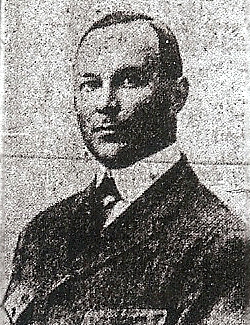
Vladimir Victor Ligda embarked on what would be a one-season stint as the Hilltoppers’ coach.
Ligda was of Russian descent but born in France. He attended high school in Oakland, and had achieved some success in track and field for California-Berkeley.
Ligda was introduced in an expansive article in The San Diego Union, which noted that he was a 1904 Cal graduate and had run :51.0 to win the 440-yard race in the annual big meet against Stanford.
That Ligda was incorrectly identified as “Vernon” Ligda seemed to presage a problematic tenure.
ACROSS THE BAY
Coach Wyman Feeler’s Coronado Islanders made quick work of County League competition and looked forward to a second season in the playoffs, in the same calendar year.
Coronado had lost to Fullerton, 18-0, in a 1918 Southern California finals game that was played in March, 1919. The CIF had managed to get two teams together three months after the normal end of the season.
The year of 1918 was notable for the Asian flu pandemic that killed an estimated 50-70 million people (at least 3 per cent of the global population) and for the end of fighting in World War I.
Some teams were able to complete seasons in January and February, others had theirs suspended, and still others were idle all season.
POLY NOT HARVARD MILITARY
Coronado, which won games by scores of 74-0 and 66-0, and was not scored on in three County League encounters, had lost only to college or service teams.
The Islanders were supposed to open the season against San Diego, but Feeler changed his mind, saying he wanted to take on San Diego at the end of the schedule.
A Hilltoppers-Islanders game did not materialize and Coronado was assigned to a CIF first-round playoff at Hollywood Harvard Military.
Harvard apparently backed out of the game, this during a time when the CIF had difficulty filling playoff brackets. The postseason did not have the cachet it would develop in later years.
Wyman Feeler telegraphed the Union sports department that Long Beach Poly was replacing the Hollywood school. Poly, with an enrollment of 1,100 and many adults on its squad, would take on Coronado, high school enrollment 100, including 47 boys.
Feeler probably didn’t want the game, but it promised a revenue bump for the school and Feeler agreed when the CIF scheduled the contest in San Diego’s City Stadium, a ferry ride and long walk from the island.
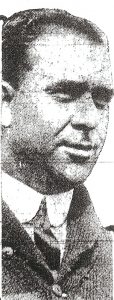
Islanders supporters in “machines” circled the streets of Coronado the night before the playoff, honking horns, stopping pedestrians in the quiet community, and inviting all to come to a pep rally at the school, highlighted by a bonfire, speeches, and a performance by jazz musicians.
The trans-bay eleven was no match for the champions of the Los Angeles County League the next afternoon. Poly was a 59-0 winner and then defeated Santa Monica, 21-0, in the semifinals and claimed the championship with a 47-0 victory over Fullerton.
FOOTBALL OR TRACK, COACH?
Victor Ligda’s resume indicated in the years following graduation that he had been an assistant professor of physical education and athletic director at the University of Arizona, and assistant professor of p.e. at Berkeley.
Ligda also had been track coach at Los Angeles Manual Arts and most recently instructor of boxing and wrestling at Camp Fremont in Menlo Park.
Football?
Ligda’s sport was track and field and he made announcements during the football season that were about the spring sport, which didn’t begin until February.
Ligda created a football pentathlon, which consisted of punting, drop kicking, placekicking, “loose” field running, a dash from one end of the field to the other, tackling, and running through hurdles placed as obstacles.
He also publicized a Stadium Day track and field carnival that was to take place in December and served as coach of the cross-country team.
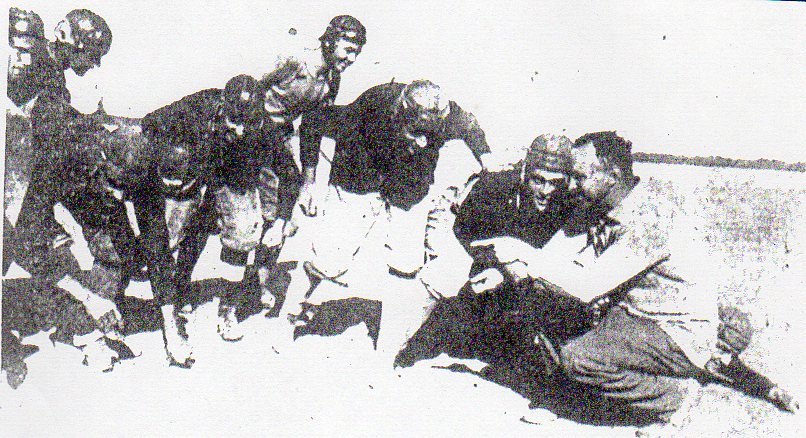
WHAT’S GOING ON?
Grumbling was heard on the Hilltop and in the local press after a lackluster tie in the Orange League opener with Orange and a loss at Whittier.
According to Don King in “Caver Conquest,” Ligda had the team show up at Whittier 10 minutes before kickoff as punishment for some players’ “horseplay” on the overnight trip to Orange.
The Union reported that the team did not have lunch during the Whittier train trip and had to immediately change from street clothes to its moleskin uniforms.
On Nov. 1, an anonymous columnist for The Sports Mint in the Union expanded on the Hilltop football program:
“Going behind the scenes we learn that the material this year is average, that coach Victor Ligda is a hard worker but not a top-notch football coach, for his specialty is track.
It was pointed out that fifth-year player Elmer Langdon became involved in coaching the team but that Ligda disapproved and requested Langdon to cease. “Does Ligda fear Langdon is stealing his thunder?” wondered the writer.
Ligda did not endear himself to the squad after a late-game loss to Pomona, 16-14.
“It was just a piece of hard luck,” said Ligda. “The boys ought to have had that game but they slacked up a little toward the end.”
LANGDON ISSUED CLEARED
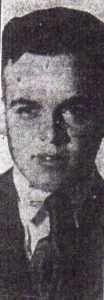
On Nov. 5 a paragraph at the end of a midweek story absolved Ligda of alleged pettiness in regard to Langdon’s coaching the team but made Ligda seem derelict in his head coaching responsibility:
“For a couple of days last week Ligda was refereeing afternoon games and was unable to be with the team, so he asked Langdon to help him out by leading the practice for those two afternoons. Ligda is taking full charge now himself.”
The school band played “Hail! Hail! The Gang’s All Here” as the Hilltoppers headed to the train station on Friday for its Saturday afternoon game at Fullerton.
“Coach A.E. Shaver accompanied the team,” it was reported. Ligda was to follow in a private vehicle that evening after supervising track practice.
The 35-0 loss to Fullerton was followed by a 7-0 win over Santa Ana and a 35-0 rout of San Pedro on Thanksgiving Day, giving the Hilltoppers a final record of 6-3-1, their best since the 12-0 of 1916.
The three losses were against Orange League foes and left the Hilltoppers in fifth and last place. Issues with Ligda continued.
“The team has been handicapped in that they haven’t had a strong hand to lead them,” wrote a Union reporter. “Coach Ligda, it is claimed, has let the players have too much their own way in running plays….”
ALOHA!
Victor Ligda resigned at the end of the school year and took a teaching position in Hawaii, where he resided for many years.
Ligda’s experience with championship Manual Arts track teams and devotion to preparing the Hilltoppers, even during football and basketball seasons, did not translate.
San Diego was winless in three track dual meets, losing to Los Angeles, 77-37, Manual Arts, 67-45, and L.A. Lincoln, 62-50.
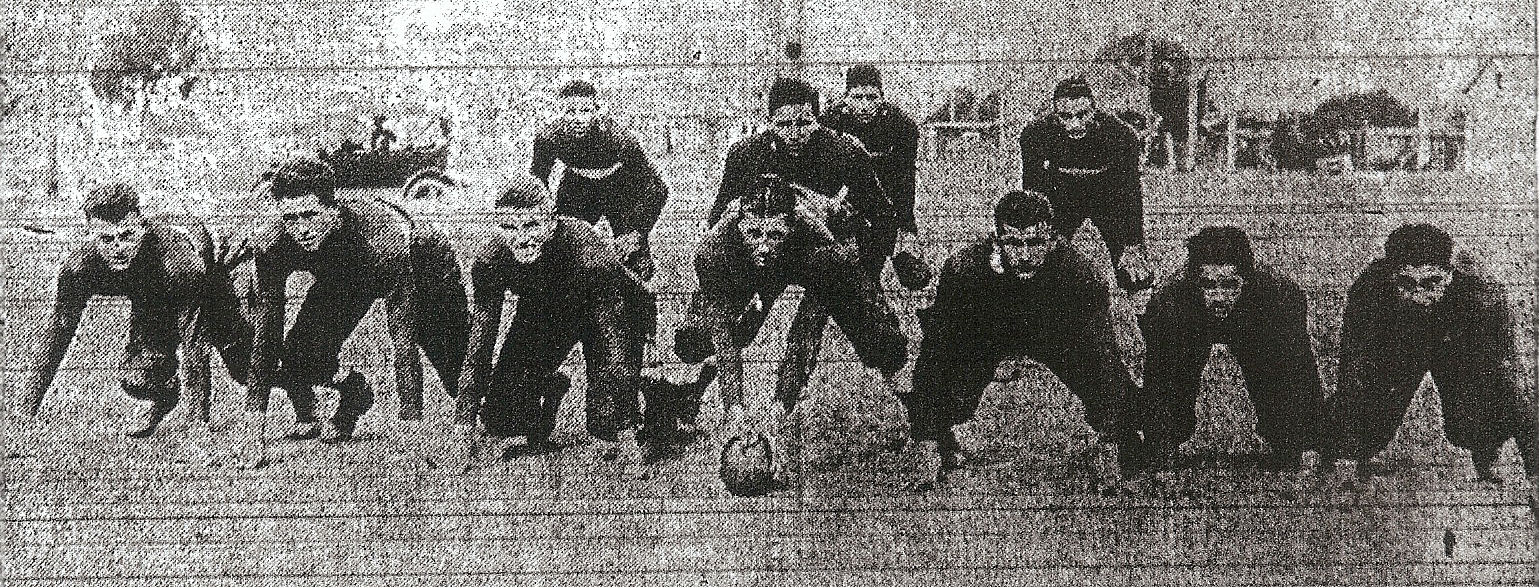
EASY ED
There is no record of how many touchdowns Ed Suggett scored in his long and legendary career at Coronado.
Suggett scored seven touchdowns in one game for Coronado in 1916 in what may have been his freshman season and probably scored at least 150 points (25 touchdowns) each in 1916 and 1917.
Individual touchdown records were of seemingly passing interest. Reporters at games or taking results on the telephones were more interested in starting lineups and substitutions.
Suggett scored so often in Coronado blowouts that no official notice was given.
Touchdowns sometimes were ignored by the media, although more complete records were available for San Diego High.
For prep historians, mystery seems to always surround Suggett.
Here was Suggett again in 1919, in at least his fourth season with the Islanders after reportedly serving in the military during World War I.
Suggett was listed as having played for the “Balboa Park Sailors,” during the war, but when? He also was reported in the starting lineup when the Islanders met Fullerton in the 1918 championship, which was played in March, 1919.
Ed Suggett went to score more touchdowns at Whittier College, played minor pro football, and became the first coach at Compton College in 1927.
QUICK KICKS
Ralph Nobel, an Army officer in Europe, was killed in action…Nobel was head coach at San Diego in 1913…many players who saw service in the military during the war returned to high school and continued eligibility…Bob Sieben, a hurdler and sprinter for the 1917 Hilltoppers’ track team, served with the Coast Artillery at Fort Rosecrans on the Point Loma peninsula, as did Fred Kunzel…Long Beach placed seven players on the all-Southern California first and second teams…San Diego and Coronado had none…Five of the eight schools in the County played football…Ramona, Fallbrook, and Julian were decades away from fielding squads….

I am doing some research on the navy football team that played for Balboa Park in 1918 since I recently purchased a program from a game between Balboa Park and Rockwell Field. The winner of that game, Balboa Park, played and lost to the Mare Island Marines for the right play Great Lakes Naval in the 1919 Rose Bowl.
In any event, the article mentions Suggett. Someone named Suggett (no first name or initial is available) is listed as a substitute on the Balboa Park roster for that game (played 12/14/18). I can provide an image of that page of the program if interested.
In my narrative on the 1919 season (go to home page and link to 1919 in the search box) I dedicated a couple paragraphs to Ed Suggett. He was ubiquitous. There is mention of his playing for the Balboa Park team and against Fullerton in the 1918 Southern California high school championship game that was played in March, 1919. Apparently the only rule on eligibility in those days was that you couldn’t be more than 21 years of age to play for a school team. There were numerous reports of players joining the military in World War I and II and then returning to their high school squads.